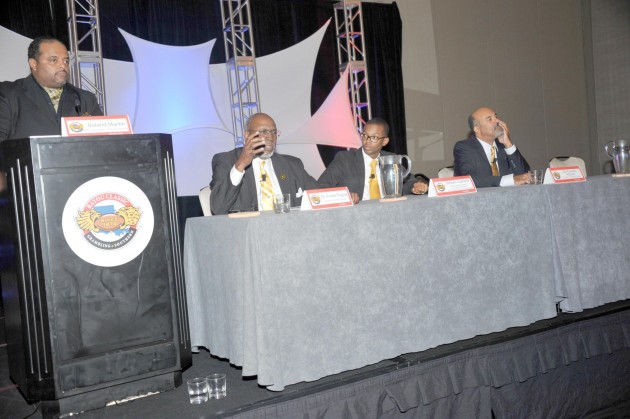
All university students would sign an anti-hazing commitment if a provocative hazing solution idea is implemented.
During a two-hour, afternoon 2012 Empowerment Exchange: HBCU Institute session, the president of Grambling State University and the President of Southern University System discussed a variety of issues involving student hazing rituals with nationally known analyst and commentator Roland Martin. Both universities have marching bands mandating that members sign such pledges.
Alumni, fans and guests filled the Empire Ballroom in the Hyatt Regency Hotel to hear a sometimes-heated discussion about pervasive hazing problems on their campuses, other HBCU campuses and elsewhere.
“When you have freshmen coming in, how are we as an institution helping them to understand and see what is acceptable and what is not?” asked Martin, a CNN analyst who also is a commentator for TV One cable-television network. Martin’s point was that for anti-hazing efforts to be more successful, the band efforts should be expanded. After asking the question several different ways, even forcefully, and with the audience applauding, Pogue and Mason Jr. agreed that it is a worthwhile idea to consider.
One audience member suggested that the problem with hazing is not with college administrations, or parents, because the officials and parents aren’t doing the hazing. Martin said, “hazing is a question of self worth.” He said anyone who is confident and respectful of self and others wouldn’t allow hazing.
The panel discussion included a Grambling State University student, Jordan Gaither, and Tamara Montgomery, an administrator with Southern University. A number of questions were asked about what college administrations are doing and should be doing to educate students and hold them accountable, to make more parents aware of these issues and potential problems and possible rewards for students who say no to hazing.
Dillard University President Walter Kimbrough tweeted during the session that Florida A&M State University made hazing a more important issue after losing its marching band drum major during a hazing ritual during which the student band member lost his life.
“The mistake we make is that we limit hazing to HBCU’s,” stated Pogue, a sociologist. He reminded the audience that hazing issues go back decades and not just at HBCUs.
The Grambling president said he pledged Alpha Phi Alpha Fraternity Inc. more than 40 years ago, he told the audience that he, too, was hazed by some who beat him with a soda crate.
After grilling the panel with questions and discussing different plans to implement stricter hazing rules, Martin gave the audience a chance to ask questions and make comments.
One comment that brought a lot of positive response was that universities need more student leaders to look into other students’ eyes and say, “There will be zero tolerance” when it comes to hazing.
Brenda Chapital, a Southern alumnus of Southern from New Orleans, said “hazing is demoralizing and serves no purpose as far as fulfilling the mission of bands, frats and/or sororities.”
After the event Mason added that he considers hazing “an insidious issue that we have to take on aggressively.” He said he “got a lot of ideas from the audience and parents … about how we can go back to our campus and do that.”
“I hope that this panel discussion will spur a conversation that they can implement changes, and you know that changes happen solely over time,” said Kim Bondy, the producer of the empowerment sessions and a former executive producer with CNN in Atlanta.
The panel discussion included a Grambling State University student, Jordan Gaither, and Tamara Montgomery, an administrator with Southern University. A number of questions were asked about what college administrations are doing and should be doing to educate students and hold them accountable, to make more parents aware of these issues and potential problems and possible rewards for students who say no to hazing.
Dillard University President Walter Kimbrough tweeted during the session that Florida A&M State University made hazing a more important issue after losing its marching band drum major during a hazing ritual during which the student band member lost his life.
“The mistake we make is that we limit hazing to HBCU’s,” stated Pogue, a sociologist. He reminded the audience that hazing issues go back decades and not just at HBCUs.
The Grambling president said he pledged Alpha Phi Alpha Fraternity Inc. more than 40 years ago, he told the audience that he, too, was hazed by some who beat him with a soda crate.
After grilling the panel with questions and discussing different plans to implement stricter hazing rules, Martin gave the audience a chance to ask questions and make comments.
One comment that brought a lot of positive response was that universities need more student leaders to look into other students’ eyes and say, “There will be zero tolerance” when it comes to hazing.
Brenda Chapital, a Southern alumnus of Southern from New Orleans, said “hazing is demoralizing and serves no purpose as far as fulfilling the mission of bands, frats and/or sororities.”
After the event Mason added that he considers hazing “an insidious issue that we have to take on aggressively.” He said he “got a lot of ideas from the audience and parents … about how we can go back to our campus and do that.”
“I hope that this panel discussion will spur a conversation that they can implement changes, and you know that changes happen solely over time,” said Kim Bondy, the producer of the empowerment sessions and a former executive producer with CNN in Atlanta.
